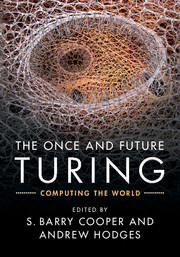Book contents
- Frontmatter
- Contents
- Contributors
- Preface
- Introduction
- Part One Inside Our Computable World, and the Mathematics of Universality
- Part Two The Computation of Processes, and Not Computing the Brain
- Part Three The Reverse Engineering Road to Computing Life
- Part Four Biology, Mind, and the Outer Reaches of Quantum Computation
- 11 Answering Descartes: Beyond Turing
- 12 The Ghost in the Quantum Turing Machine
- Part Five Oracles, Infinitary Computation, and the Physics of the Mind
- Afterword
- References
11 - Answering Descartes: Beyond Turing
from Part Four - Biology, Mind, and the Outer Reaches of Quantum Computation
Published online by Cambridge University Press: 05 March 2016
- Frontmatter
- Contents
- Contributors
- Preface
- Introduction
- Part One Inside Our Computable World, and the Mathematics of Universality
- Part Two The Computation of Processes, and Not Computing the Brain
- Part Three The Reverse Engineering Road to Computing Life
- Part Four Biology, Mind, and the Outer Reaches of Quantum Computation
- 11 Answering Descartes: Beyond Turing
- 12 The Ghost in the Quantum Turing Machine
- Part Five Oracles, Infinitary Computation, and the Physics of the Mind
- Afterword
- References
Summary
Introduction
The first half of the twentieth Century was filled with a stunning group of scientists, Einstein, Bohr, von Neumann and others. Alan Turing ranks near the top of this group. I am honored to contribute to this volume commemorating his work. How much do we owe one mind? His was a pivotal role in the cracking of the Nazi war code, which profoundly aided the defeat of Nazism. His invention of the Turing machine has revolutionized modern society, from universal Turing machines to all digital computers and the IT revolution. His model of morphogenesis, the first example of a ‘dissipative structure’, to use Prigogine's phrase, is one I have myself used as a developmental biologist.
I rightly praise Turing, but seek in this chapter to go beyond him. The core issue is the human mind. Two lines of thought, one stemming from Turing himself, the other from none other than Bertrand Russell, have led to a dominant view that the human mind arises as some kind of vast network of logic gates, or classical physicsconsciousness neurons', to use F. Crick's phrase in The Astonishing Hypothesis (Crick, 1994), connected in the 1011 neurons of the human brain.
I think this view could well be right, but is more likely to be wrong. My aim in this chapter is to sketch the lines of thought that lead to the standard view in computer science and much of neurobiology, and note some of the philosophic claims for and doubts about the claim; but most importantly I wish to explore the emerging behavior of open quantum systems in an environment, their new physics, and, centrally, our capacity to construct what I will call non-algorithmic, non-determinate yet non-random Trans-Turing Systems. As we shall see, Trans-Turing Systems are not determinate, for they inherit the indeterminism of their open quantum system aspects, yet they are non-random owing to their classical aspects. They are new to us and may move us decisively beyond the beauty, and limitations, of Turing's justly famous, but purely classical-physics, discrete-time and discrete-state machine.
Beyond the above, I shall make one truly radical proposal that I believe grows out of “sum over all possible histories” formulation of quantum mechanics (Feynman,1948).
- Type
- Chapter
- Information
- The Once and Future TuringComputing the World, pp. 163 - 192Publisher: Cambridge University PressPrint publication year: 2016
References
- 3
- Cited by

